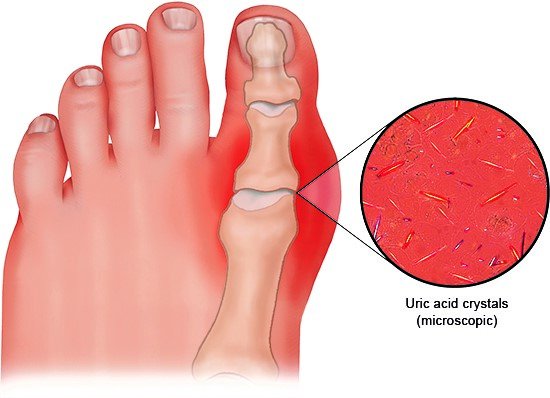Ayoub-Charette S, Liu Q, Khan TA et al. Important food sources of fructose-containing sugars and incident gout: a systematic review and meta-analysis of prospective cohort studies. BMJ Open 2019; 9(5): e024171.
Harrold LR, Mazor KM, Velten S et al. Patients and providers view gout differently: a qualitative study. Chronic Illn 2010; 6(4): 263-271.
Jamnik J, Rehman S, Blanco Mejia S et al. Fructose intake and risk of gout and hyperuricemia: a systematic review and meta-analysis of prospective cohort studies. BMJ Open 2016; 6(10): e013191.
Li X, Meng X, Timofeeva M et al. Serum uric acid levels and multiple health outcomes: umbrella review of evidence from observational studies, randomised controlled trials, and Mendelian randomisation studies. BMJ 2017; 357: j2376.
Martini N, Bryant L, Te Karu L et al. Living with gout in New Zealand: an exploratory study into people's knowledge about the disease and its treatment. J Clin Rheumatol 2012; 18(3): 125-129.
Newberry SJ, FitzGerald JD, Motala A et al. Diagnosis of Gout: A Systematic Review in Support of an American College of Physicians Clinical Practice Guideline. Ann Intern Med 2017; 166(1): 27-36.
Qaseem A, Harris RP, Forciea MA. Management of Acute and Recurrent Gout: A Clinical Practice Guideline From the American College of Physicians. Ann Intern Med 2017; 166(1): 58-68.
Qaseem A, McLean RM, Starkey M et al. Diagnosis of Acute Gout: A Clinical Practice Guideline From the American College of Physicians. Ann Intern Med 2017; 166(1): 52-57.
Richette P, Bardin T. Gout. Lancet 2010; 375(9711): 318-328.
Roddy E, Mallen CD, Doherty M. Gout. BMJ 2013; 347: f5648.
Shekelle PG, FitzGerald J, Newberry SJ et al. Management of Gout. (AHRQ Comparative Effectiveness Reviews; No. 176). 2016.
Tausche AK, Jansen TL, Schröder HE et al. Gout – current diagnosis and treatment. Dtsch Arztebl Int 2009; 106(34-35): 549-555.
IQWiG health information is written with the aim of helping people understand the advantages and disadvantages of the main treatment options and health care services.
Because IQWiG is a German institute, some of the information provided here is specific to the German health care system. The suitability of any of the described options in an individual case can be determined by talking to a doctor. informedhealth.org can provide support for talks with doctors and other medical professionals, but cannot replace them. We do not offer individual consultations.
Our information is based on the results of good-quality studies. It is written by a team of health care professionals, scientists and editors, and reviewed by external experts. You can find a detailed description of how our health information is produced and updated in our methods.


